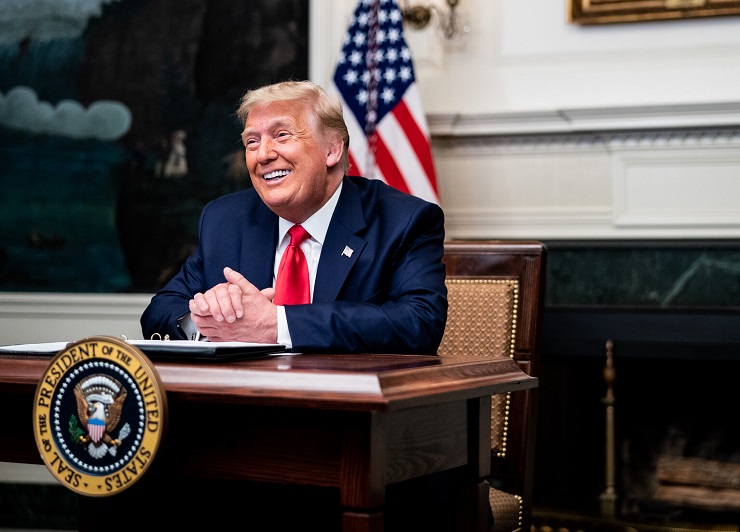Everybody’s talking about Jack Dorsey banning Donald Trump on Twitter. The public is being churned into crazy sour cream because the social networks have gagged the big mouth Looney Toons billionaire over allegedly inciting an insurrection at the US Capitol. But nobody, and I mean nobody seems to get it. Trump could care less about twisting hearts and minds on his Twitter feed. Informing his “peeps” is the subterfuge the bombastic Trump uses, to diffuse the real reason he’s even on the social platform. Money, and boatloads of it, are Trump’s information overload mission.
During his time in office, Donald Trump has Tweeted more than 200 times about Wall Street directly. Most of these Tweets were about how the market had boomed since he took office, but many other direct mentions contained buy or sell cues, at least in my opinion. A recent New York Times story suggests Wall Street is ready to unfollow Trump out of disdain, but the author gets things all wrong. One paragraph, though, reveals the tip of a market manipulation iceberg:
“He [Trump] has publicly threatened and castigated major American companies, facing off with Amazon.com over its tax payments and deals with the US Postal Service; with General Motors, Ford and Carrier — then a subsidiary of United Technologies — over plans to shutter plants; and with Lockheed Martin and Boeing over the costs of fighter jets and replacements for Air Force One.”
Now, you must be asking the same question I’m wrestling with here, “Why would he do that?” No president in modern history has gone so far as to take a chance on busting the market. The NYTs piece refers to John F. Kennedy reworking his media strategy when he criticized the steel industry and inadvertently crashed their stocks temporarily. The answer on Trump Wall Street Tweet business is simple, he used to lever the office of the presidency for profit, and Wall Street loved it. Anybody at a hedge fund with half a brain has already made out like a pirate on Trump’s Twitter outlandishness. Anyone, that is, who’s in the loop.
From tax fears to tax cuts, China trade to Syrian missile strikes, the former president perfected what I would call “push button profits” for high officials. New York Times writer Matt Phillips focuses on how Trump sent the market tumbling on many occasions, but he failed to examine what and who happened in the “buy period” following the Trump Tweets. I won’t go into specific Tweets, just be assured that if I can figure out how to make billions by nosediving stocks and then resurrecting them, the billionaire loud mouth and his slum lord son-in-law certainly can. Tweet you’re about to use your “shiny new missiles” on Syria, and see what happens to Raytheon and General Dynamics stocks. The 2017 Shayrat missile strike was a prime opportunity for Trump or his agents and allies to rake in a few tens of millions. The Motley Fool reveals more on Raytheon’s “Trump Bump” in an article describing the defense contracting giant’s 2017 boom. I could list dozens of more examples, but the reader is already pondering similar opportunities. Interestingly, Trump was not the first world figure to clue me to market manipulation by officials, Hillary Clinton was.
Back in 2014, I wrote a report for RT entitled “Death & lies: The only truth of flight MH17”, in which I shared the strange case of a Hillary Clinton slip on the Charlie Rose Show. The former Secretary of State quipped at a point about looking at exchange rates on her Blackberry before arriving at the studios for the interview. With the passengers not yet identified from the tragedy, Clinton was focused on the fall of the rouble and defaming Vladimir Putin as the alleged supervillain who shot down innocents. I have always wondered how much loot the Clinton’s put down on the Russian currency nosediving?
Now that Joe Biden has taken office, it’s clear that Trump was scrambling feverishly to rake in more dough from his personal profit during his last months in office. A short while ago he moved to virtually shut down Chinese super smartphone producer Huawei Technologies, by revoking the licenses of key suppliers to the company. Without Twitter, Trump and his insider friends would not get the amplified Twitter effect on Apple and Samsung buys. Knowledge before events, the capability to act before the buy or sell trend, and the added boost of presidential boasting on Twitter to the general stock buyers – you figure it out.
It seems reasonable to say at this point, that Trump’s attitude and actions from the onset of the COVID-19 pandemic were structured to usher in a fantastic bull market that currently exists. This is why all the billionaires have raked in tons of cash at a time when normal people have lost everything. Refer to the charts, the New York Times story has good ones. Rate hike fears 2018, then the massive recovery. The China trade war in late 2018, then the humongous recovery. Then the coronavirus in early 2020 with another fantastic recovery until now. The great mystery is always confronting us, how do billionaires become trillionaires when everybody else loses? Now you know, at least in part, the tools of wealth-building today. Buy a president, get him to make decisions that benefit, then let him Tweet the amplifier effect. All you have to do is forget about death, lies, and misery that goes along with the Tweets. Twitter dumped Trump supposedly to prevent any further violence, the real reason was to steady the market I think.
Phil Butler, is a policy investigator and analyst, a political scientist and expert on Eastern Europe, he’s an author of the recent bestseller “Putin’s Praetorians” and other books. He writes exclusively for the online magazine “New Eastern Outlook.”

